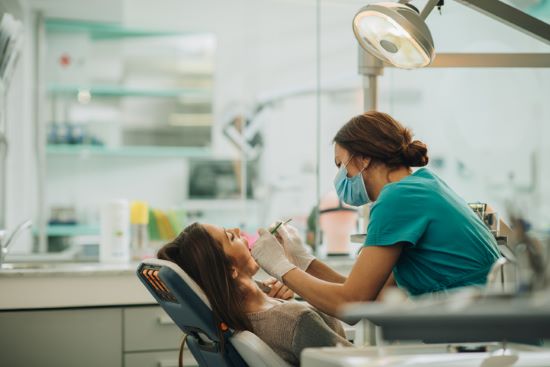Enter your email to receive the CareQuest newsletter:
January 2, 2024
As Operations and Policy Analyst I at the Oregon Health Authority (OHA), Vesna Hopkins has the goal of helping Oregonians get better access to oral health care.
“As a dental analyst, my boss says, ‘Challenge me. Give me ideas. Tell me how do you want to improve dental health for Oregonians, and let’s talk about it,’” Hopkins says. “So, I’m in a position to have the freedom to simply say, ‘It’s my educated opinion that Oregonians need help in dental here or here.’”
The OHA is a government agency that oversees most of Oregon’s health-related programs, including the state’s Medicaid program, which provides coverage for 1.5 million Oregonians. Hopkins is on the team that handles the dental part of the program — even though she’s not trained as a clinician.
“I’m not a dentist,” Hopkins says. “I’ve never been in a dental or dental hygienist role.”
But Hopkins does have a strong dedication to serving Oregonians. She worked for the Oregon Department of Human Services for 15 years before her job at OHA, and she loves to learn. She takes it upon herself to learn as much about oral health care as she can, including investing her time in CareQuest Institute education.
“Being in a position now to handle a dental program, I feel that CareQuest Institute’s webinars are very valuable to me so I can learn as much as I can about dentistry,” Hopkins says. “So then when I’m supposed to make decisions regarding our dental program, I am more informed and knowledgeable.”
Diving into Oral Health Care Education
Hopkins attended the CareQuest Institute webinar “Managing Dental Caries: Evolving Strategies and Proven Techniques” back in August. (The education from the webinar is the foundation of a new self-paced course.) In the webinar, experts explored the importance of avoiding a “one-size-fits-all” approach to caries management and shared guidance on nonsurgical and nonrestorative protocols and implementation.

Hopkins says she learned a lot of valuable information about preventive care.
“In my mind, any prevention is much better than fixing a problem once it appears,” Hopkins says. “So, I think we should work on approving all the possible preventive procedures that exist and are out there, versus waiting for a problem to happen.”
She also found value in the research articles experts shared during the webinar and put them to immediate use at OHA, helping to emphasize the importance of preventive care. For example, right now, teeth cleanings are only covered once a year for adults enrolled in Medicaid.
“I can say, ‘That’s not enough,’” Hopkins says. “My argument would be: Based on my classes I’ve taken through CareQuest Institute on prevention, based on my continuing education, based on my research articles that I’ve read, I think it [preventive care] should be done [more frequently] at any time.”
Increasing Access to Oral Health Care at OHA
During Oregon’s legislative sessions, Hopkins will analyze five bills involving oral health care, exploring how they will affect Oregonians. If they pass, she will update the codes accordingly. Hopkins also has a hand in helping create policy changes for people enrolled in Medicaid.
One of the policy changes that Hopkins helped make was OHA providing coverage for people under 21 years old who are enrolled in Medicaid and have handicapping malocclusions (crooked, crowded, or protruding teeth that affect appearance, speech, and/or the ability to eat) to get braces. That change became effective at the beginning of 2023.
“Braces are not something that most states cover,” Hopkins says. “So I was happy that I was involved in a bill that we’re going to implement that is going to cover some braces for people who are really struggling. It affects their whole body, not just their mouth. It trickles down to other issues.”
During the nonlegislative session, in January and October, Hopkins researches Oregon’s dental codes and reimbursements to see if they are comparable to those of other states. She also talks to local dentists and orthodontists to see what private insurance companies are paying.
If the reimbursements are not comparable, Hopkins and the rest of the OHA team determine what a comparable rate or change would be and what Oregon can afford to pay, then they make an effort to readjust the dental codes. That includes explaining to the legislature how this change would affect Oregonians and getting feedback from the public.
One dental code she is currently working to change involves dentures. Oregon’s current Medicaid coverage allows a person to get new dentures every 10 years. But Hopkins discovered that many people needed new dentures long before that.
“In my research, speaking to denturists, I found out that a lot of dentures are being stolen. . . . Dentures are so expensive, and new ones are only made once every 10 years, and people don’t have access to them,” Hopkins says. “Not to mention, physiologically, people’s mouths and bites and faces change within 10 years, especially in adult years.”
With that information, Hopkins suggested to her boss that Oregonians who need dentures should be able to get new ones every 5 years, instead of 10.
“That’s how I get challenged. That’s how I make oral health better,” Hopkins says. “Based on my knowledge, and my information, and based on the research I did, and based on my awesome boss who allows me to challenge him on stuff like that, now all the Oregonians who need dentures would have them in 5 years instead of 10 years.”
Examples like that, examples of fighting for the best oral health care interests of Oregonians, are challenges she fully accepts.
“Because, in the end, it’ll be much cheaper for anybody to provide preventive care versus dealing with a cavity,” she says. “Filling a cavity is $1,200, versus a preventive topical application of fluoride is $3 or $5. So, in my mind, I have an excellent argument.”